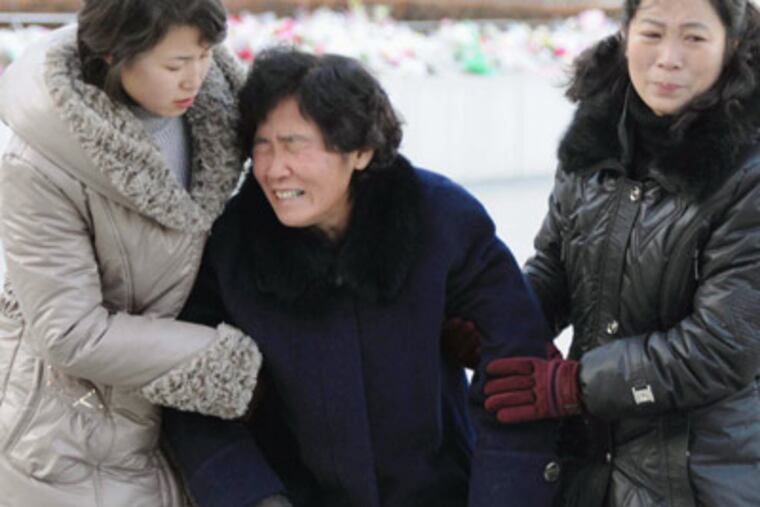N. Koreans mourn loss of Kim
Thousands pour into the capital, grieving the death of their "Dear Leader."

PYONGYANG, North Korea - North Korea prepared to lay longtime ruler Kim Jong Il to rest while the hermit state's official media lauded his son and heir apparent Tuesday as a person "born of heaven" - suggesting the transition to a new leadership was under way.
The state media proclaimed Kim Jong Un a "Great Successor," while a vigilant world watched for any signs of a turbulent transition to the untested leader in an unpredictable nation known to be pursuing nuclear weapons.
President Obama agreed by phone with South Korean President Lee Myung-bak to closely monitor developments. Japan's government also said it was being vigilant.
The streets of the North Korean capital were quiet Tuesday morning as thousands grieved. With an 11-day mourning period in effect for their "Dear Leader," flags flew at half-staff, shops were closed, and streams of mourners - some wailing - placed flowers at memorials around the city.
"Today, as well as yesterday, the Korean people have been coming here to Mansu Hill in deep sorrow at the loss of the benevolent father of our nation with the infinite feeling of longing," said Ri Ho Il, a lecturer at the Korean Revolutionary History Museum.
Kim Jong Il died Saturday of a massive heart attack brought about by overwork and stress, according to the North's media. He was 69 - though some experts question the official accounts of his birth date and location.
The North said that it would place Kim's body in the Kumsusan memorial palace in Pyongyang and that his funeral would be Dec. 28. No entertainment will be allowed during an 11-day mourning period, and the country will accept no "foreign delegations hoping to express condolences," it said.
Kim's death and the possibility of a power struggle raised tensions in the region. South Korea's military was put on high alert, and experts warned that the next few days could be a crucial turning point for the North, which though impoverished by economic mismanagement and repeated famine, has a relatively well-supported armed forces numbering 1.2 million.
"The situation could become extremely volatile. What the North Korean military does in the next 24 to 48 hours will be decisive," said Bill Richardson, a former U.S. ambassador to the United Nations who has made several high-profile visits to North Korea.
The North said in a dispatch that the people and the military "have pledged to uphold the leadership of comrade Kim Jong Un," Kim Jong Il's third son, and called him a "Great Successor" of the country's revolutionary philosophy of juche, or self-reliance.
Kim was in power for 17 years, succeeding his father, Kim Il Sung, the charismatic founder of the North Korean nation.
His death could set back efforts by the United States and others to get Pyongyang to abandon its nuclear-weapons ambitions, because the untested successor may seek to avoid any perceived weakness as he moves to consolidate control.
China, a key North Korea ally, wants to keep its socialist neighbor stable but also free from U.S. and South Korean influence. It worries that a North Korean meltdown could send North Korean refugees pouring over its border, creating a potential security mess and straining the far-from-robust economy of China's northeast.
Stock markets in South Korea and elsewhere in Asia fell Monday on the news of Kim's death, which came at a sensitive time as North Korea prepares for next year's 100th anniversary of the birth of Kim Il Sung. Preparations include massive construction projects throughout Pyongyang as part of Kim Jong Il's unfulfilled promise to bring prosperity to his people.
Overseas critics of the regime have accused it of holding back food so it can lavish its people with heftier supplies for the anniversary. According to the United Nations, three million North Koreans, or more than 10 percent of the population, are underfed.
Domestic unrest may percolate, analysts said, as North Koreans tire of poverty, and the mobile phones and Internet connections that are a product of recent changes leave them better informed about the outside world.
The two-day gap between Kim's death Saturday on a train and its public announcement Monday underscored the government's nervousness, analysts said.
"The fact that they delayed for two days goes to show that the North Koreans are worried about instability," said Gong Keyu of Shanghai's Institute for International Studies.
Concerns are high that Kim Jong Un - being young and largely untested - may feel he needs to prove himself by precipitating a crisis or displaying his swagger on the international stage.
North Korea conducted at least one short-range missile test Monday, a South Korean official said. But South Korea's military said the firing was part of a scheduled routine drill, instead of a provocation, the official said, speaking on condition of anonymity because of a policy that bans commenting on intelligence matters.
North Korea conducted two nuclear tests in 2006 and 2009 and is thought to have enough plutonium for at least a half-dozen weapons. But experts doubt the North has mastered the technology needed to mount a nuclear warhead on a missile.
South Korea's President Lee urged his people to remain calm while his cabinet and the parliament convened emergency meetings.
The Defense Ministry said the South Korean military and the 28,500 U.S. troops stationed in South Korea bolstered reconnaissance and were sharing intelligence on North Korea. Lee also talked with the leaders of Japan and Russia.